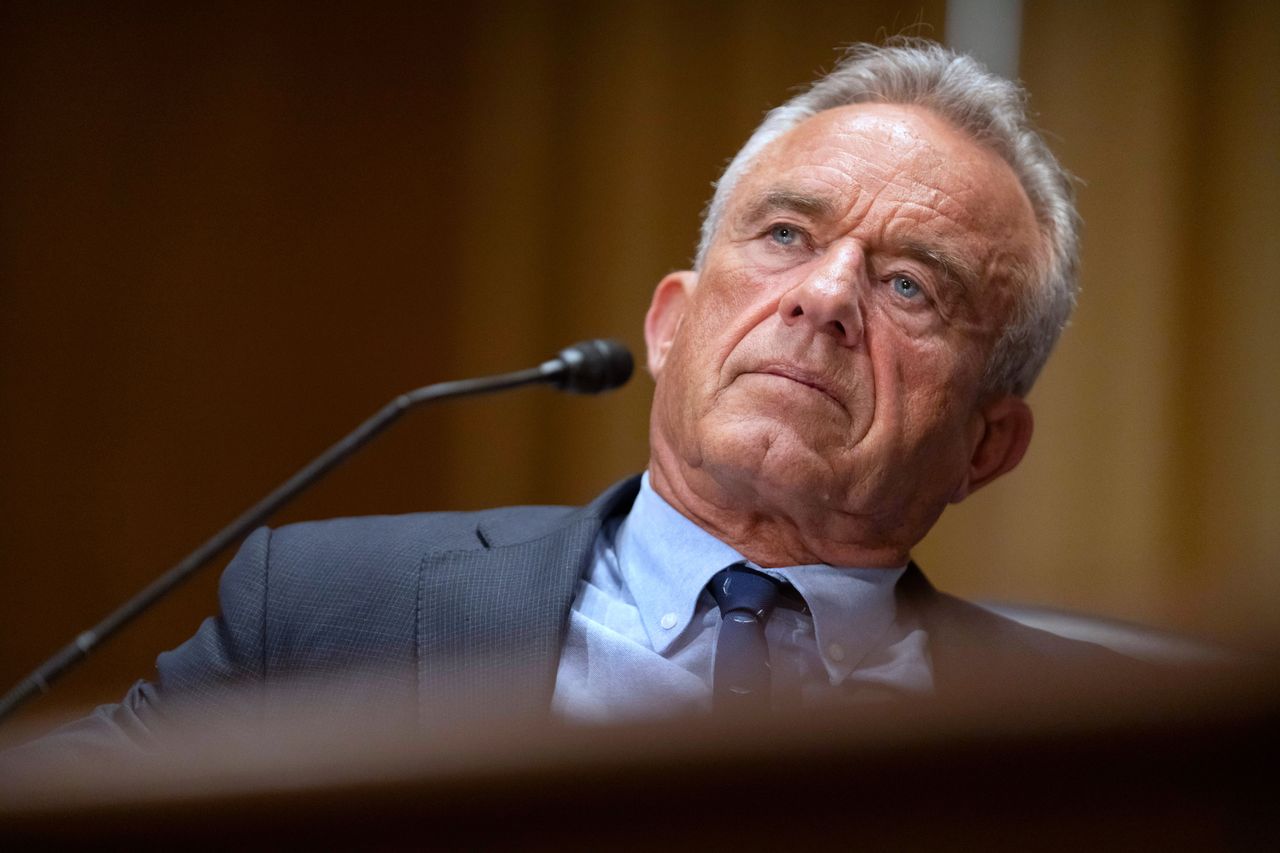| |  | | | | |  | By Megan R. Wilson | - Vaccine fight heats up: A rift within the GOP is becoming an early flash point for 2026 elections. And a powerful CDC advisory board on vaccines — stacked with Health and Human Services Secretary Robert F. Kennedy Jr.'s appointees — meets next week.
- Funding cliff nears: Community health center grant funds and the eased Medicare telehealth rules are among the top health “extenders” that expire by Oct. 1.
- PBMs under pressure: Trump administration signals new transparency rules for pharmacy benefit managers as congressional proposals stall.
Welcome to the inaugural issue of the new Health Brief newsletter. I’m Megan Wilson. I’ll be taking you through the policy fights, industry shake-ups and political capital (and actual cash) shaping health care in Washington and beyond. We’re in a pressure-cooker moment for health care policy, as an ambitious Trump administration agenda collides with looming fiscal deadlines and global trade tensions that have major industry players on edge. In the weeks ahead, Congress will be staring down a shutdown threat with critical health programs caught in the crossfire. Could extending the Affordable Care Act premium tax credits be a bargaining chip in these negotiations? At the same time, the Trump administration is barreling toward a major deadline in its “most favored nation” drug pricing push, with pharma giants ordered to offer “binding commitments” to address the president’s pricing goals in just three weeks. I’ll also be tracking K Street contracts, the Wild West of GLP-1 weight loss drugs, the upward trajectory of psychedelics as medicine, and scrutiny of the Medicare Advantage program — among many other storylines. I want to hear from you. Do you have any tips, scoops or intel? Are you acting CDC director Jim O’Neill? You can find me at megan.wilson@washpost.com or on Signal at megan.434. This newsletter is published by WP Intelligence, The Washington Post’s subscription service for professionals that provides business, policy and thought leaders with actionable insights. WP Intelligence operates independently from the Washington Post newsroom. Learn more about WP Intelligence. |  | | Health Secretary Robert F. Kennedy Jr. testified last week before the Senate Finance Committee. (Mark Schiefelbein/AP) | | | |  | The Lead Brief | A showdown over vaccines is unfolding at the highest levels of government — and the fallout is beginning to reshape the federal-state balance on public health. The Center for Disease Control and Prevention’s Advisory Committee on Immunization Practices (ACIP) meets next week and is expected to weigh in on key vaccine recommendations — but the normally low-profile panel is under new pressure. Health and Human Services Secretary Robert F. Kennedy Jr. dismissed the members of the advisory panel in June, replacing them with a handful of his own picks — including several with histories of vaccine skepticism. NEW FROM THE POST: “RFK Jr. weighs adding critics of coronavirus shots to key vaccine panel” The federal shake-up is pushing states in opposite directions: Florida has withdrawn all childhood vaccine mandates, while some blue states, fearing a federal retreat, are developing their own immunization guidance. The Growing Divide On Friday evening, President Donald Trump distanced himself from views of some of his allies who are pushing to ease long-standing mandates for measles, polio and other childhood vaccines. “You have some vaccines that are so incredible. And I think you have to be very careful when you say that some people don’t have to be vaccinated,” he said when asked about Florida’s recent move away from mandates. The comments came just one day after Kennedy clashed for hours with senators on both sides of the aisle in a high-profile hearing, defending the ouster of Susan Monarez as leader of the CDC after only a month on the job and brushing off criticism over his moves to weaken vaccine access. → But the vaccine divide isn’t just philosophical. It’s creating real-world policy confusion that’s beginning to ripple across the health care industry. The uncertainty has created questions for insurers around coverage and reimbursement and left pharmacies scrambling to figure out whether they can stock or offer covid shots. A spokesperson for the Department of Health and Human Services tells me that under Kennedy’s leadership, HHS “is returning focus to the doctor-patient relationship” and “encourages individuals to talk with their healthcare provider about any personal medical decision, including vaccines.” The 2026 Impact Trump, who has defended Kennedy, is also trying to thread the needle on vaccine messaging. (And the president has his own history of oscillating between support and skepticism of the shots.) Trump recently posted on Truth Social demanding pharmaceutical companies publicly release data to “justify the success” of the vaccines, saying that the CDC is “being ripped apart” over the debate about their safety and efficacy. → And the politics around vaccinations are unlikely to fade. The issue is already shaping early positioning for the 2026 midterms, with Trump-aligned pollsters finding that both his base and swing voters overwhelmingly believe vaccines save lives. Conservative firm Fabrizio/Ward, which has conducted polls for the president, privately briefed Republican senators on those results ahead of Kennedy’s contentious appearance before the Senate Finance Committee, according to a new report from my colleagues Dan Diamond, Theodoric Meyer and Rachel Roubein in the Washington Post newsroom. A notable detail from their story: | “Some Republican senators and pharmaceutical executives are mounting a push to belatedly recognize Trump for his first administration’s coronavirus vaccine program — identifying it as a way to drive a wedge between the president and Kennedy, who has previously claimed that the shots are ‘the deadliest vaccine ever made.’” | | | | What to Watch The discourse could ratchet up ahead of ACIP’s meeting next week. The Senate Homeland Security and Governmental Affairs Committee is holding a hearing on Tuesday titled “How the Corruption of Science has Impacted Public Perception and Policies Regarding Vaccines” — but no witnesses or agenda are available. | | | |  | Health on the Hill | Simmering below the overall debate over government funding is a suite of health programs and policies that need to be extended by Congress before October to continue, sending advocates to Capitol Hill to ensure they don’t fall by the wayside. Although Congress has historically acted on these “extenders” in the past, lobbyists tell me they’re not taking anything for granted. There are roughly 18 programs and policies that need to be extended to continue, most directly affecting providers, including several critical safety-net efforts like funding for community health centers, the National Health Service Corps and residency programs that train doctors to work in rural and underserved communities. The biggest-ticket items are: - Community Health Center Program funding, which represents about 70 percent of federal funding for health centers, would cost roughly $4.3 billion on an annualized basis if current levels are extended.
- Delaying Medicaid cuts to hospitals that treat a large number of low-income patients, known as Disproportionate Share Hospitals, would cost about $2.74 billion on an annualized basis, based on a Congressional Budget Office estimate.
- Extending the relaxed rules around receiving virtual care in Medicare implemented at the height of the pandemic would cost nearly $1.5 billion annually, using CBO’s calculation.
Lobbyists for providers warn the consequences would be disastrous, particularly in the wake of the anticipated increase in uncompensated care following the passage of the One Big Beautiful Bill, which the CBO estimated would trigger $1 trillion in cuts to Medicaid over a decade. But, at least in the area of the telehealth extensions, the uncertainty is already having impacts on the industry. During the pandemic, the government relaxed rules that allowed Medicare patients to receive care at home through telehealth. Many of those flexibilities end Sept. 30. Len Marquez, the senior director of government relations and legislative advocacy at the Association of American Medical Colleges, said some of the group’s members are already asking about how to handle telehealth appointments into next month: “They’re asking, ‘Can we start scheduling patients for October?’” When it comes to community health centers, a Commonwealth Fund report from last fall found that they’re in dire financial shape, even with the federal grant dollars. The industry is emphasizing to policymakers the value that health centers provide in preventive care — a major priority for the administration. Lobbying Push Next week, the National Association of Community Health Centers is bringing 100 advocates to Washington from throughout the country as part of its fourth fly-in of the year to urge policymakers to fund the program, arguing health centers save lives and tax dollars. Joe Dunn, the group’s chief policy officer, said there are health centers in all but three congressional districts, serving nearly 34 million patients, and that they will be trying to leverage those constituent connections with lawmakers. “This is a real concerted effort to be in D.C., in force, every few months to just remind people what's at stake in their communities,” he said. This is the sixth round of funding extensions in just two years, which has prompted an unprecedented level of outreach to lawmakers, with letters, calls and office visits from the group and its members, Dunn said. | | | |  | Under the Radar | The Labor Department released its regulatory agenda last week, which includes a planned rulemaking that would require pharmacy benefit managers to disclose the fees and compensation they receive to their employer health plan clients. → The move begins implementation of an executive order aimed at lowering drug costs and would peel back the curtain on how PBMs operate. The Business Group on Health, an industry group that represents employers, said it’s “actively engaged” with the department on the issue. “Business Group on Health supports robust, clear and flexible requirements that will facilitate clearer, more transparent and more innovative payment arrangements, empowering employers to deliver improved health benefits to employees and their families,” Garrett Hohimer, the group’s vice president of policy and advocacy, said in a statement. PBMs have become one of the most powerful players in health care and have picked up a slew of bipartisan critics along the way. They sit between insurers and drugmakers, negotiating discounts on medicines and managing the formularies of which drugs are covered. The industry claims it lowers the price of prescriptions, but lawmakers in both parties have charged it with inflating costs while pocketing fees. The battle has been a magnet for lobbying spending, with drugmakers and community pharmacists spending millions each year in advertising and advocacy efforts against PBMs. The Pharmaceutical Care Management Association, the industry group representing PBMs, did not comment on the upcoming rulemaking. The three largest PBMs — CVS Caremark, Express Scripts and Optum Rx — are all owned by insurance companies and control roughly 80 percent of the prescription market, drawing scrutiny from state and federal regulators and legislative bodies. As a result, large companies have tried to implement more transparent offerings to stave off further attention. What to Watch Congress has floated reform efforts amid a patchwork of state laws targeting PBMs for years, but the provisions have failed as larger health package efforts faltered. However, there’s already chatter about whether some of the popular provisions could find their way back into a year-end package. | | | | | | | | | | |